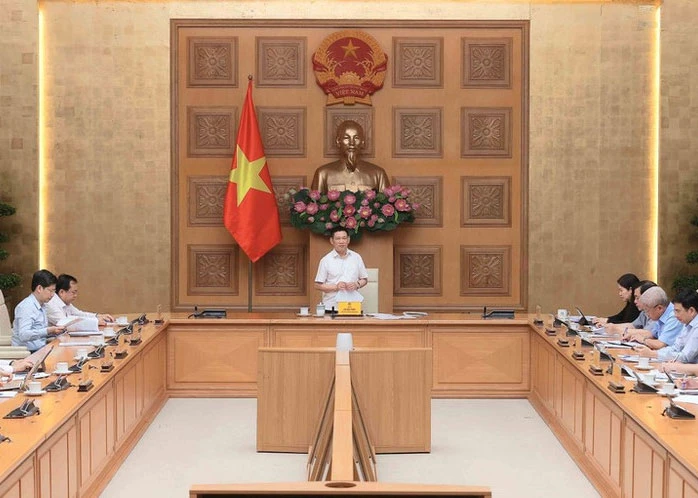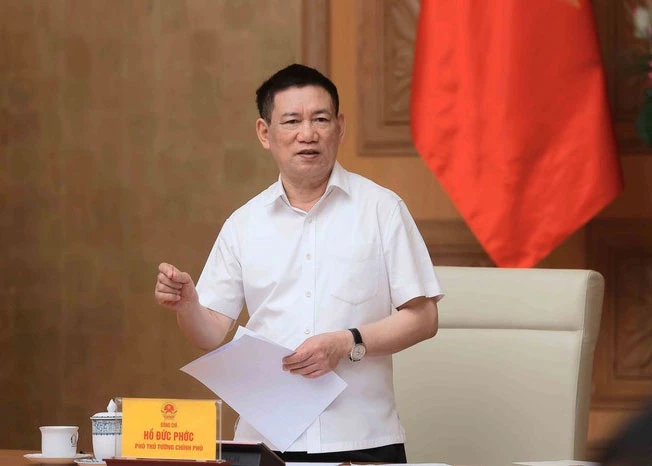Deputy PM requests concerted solutions for stronger price management
Deputy Prime Minister Ho Duc Phoc, head of the Steering Committee for Price Management, has requested ministries, sectors, and localities closely track supply-demand trends and market prices of goods within their jurisdiction to take timely and appropriate actions.
 |
| Deputy Prime Minister Ho Duc Phoc chairs the Steering Committee for Price Management's meeting on August 5 (Photo: VNA) |
The Deputy PM chaired a meeting of the committee on August 5 to review price management over the first seven months of 2025 and set the course for the remainder of the year.
According to a report delivered by Deputy Minister of Finance Le Tan Can, after rising during the Lunar New Year (Tet), the Consumer Price Index (CPI) eased in March before increasing slightly in April and May (0.07%–0.16%) and rising more sharply in June (0.48%) due to higher construction material and fuel prices following global fluctuations.
CPI for the first seven months is estimated to have increased 3.2–3.3% year-on-year — a level that supports economic growth and falls within the 4.5–5% target set by the National Assembly and the Government.
The Ministry of Finance projects CPI will rise 3.7–4% in the remaining five months of 2025. International organisations forecast Viet Nam’s average inflation at between 2.9% and 4.2% for the year, leaving room for monthly increases of 1.19–1.58% without breaching the year-end inflation target.
The Steering Committee affirmed that price regulation has generally met its goals so far. Members proposed practical policy adjustments to reinforce rapid and sustainable development.
Commending the members' input, Deputy PM Phoc emphasised the importance of coordinated price management, explaining that if inflation is not effectively controlled, economic growth becomes meaningless for livelihoods and businesses.
 |
| Deputy Prime Minister Ho Duc Phoc speaks at the Steering Committee for Price Management's meeting on August 5. (Photo: VNA) |
He directed the Ministry of Finance, as the committee’s standing agency, to finalise the report to take future price management solutions. Ministries, sectors, and localities must closely monitor essential goods, especially fuel, electricity, rice, and meat, and be ready with responsive price control measures, he requested.
The Ministry of Construction and the Ministry of Agriculture and Environment were tasked with coordinating provincial authorities to develop structural, long-term solutions for real estate market management.
The Deputy PM also called for coordinated policies in money supply, exchange rates, electricity pricing, and input material costs, all aimed at keeping CPI within a stable range while supporting growth. By October, ministries and agencies must prepare 2026 price management plans for key commodities to enable proactive management, he asked.
He instructed ministries and localities to continue to track domestic price movements, ensure supply-demand balance, and act swiftly to avoid shortages or sudden price spikes, especially for essentials such as fuel, food, construction materials, and agricultural inputs.
He also stressed the importance of enforcing price registration, public listing, and transparency. Unjustified price increases that destabilise markets must be strictly handled.
Price management must align with fiscal and monetary policies and others to stabilise the macro economy, control inflation, and keep key economic balances. At the same time, transparent information on pricing, especially for critical inputs and essentials, is vital to managing inflation expectations and maintaining confidence among consumers and businesses, the Deputy PM underscored.
NDO





READER COMMENTS